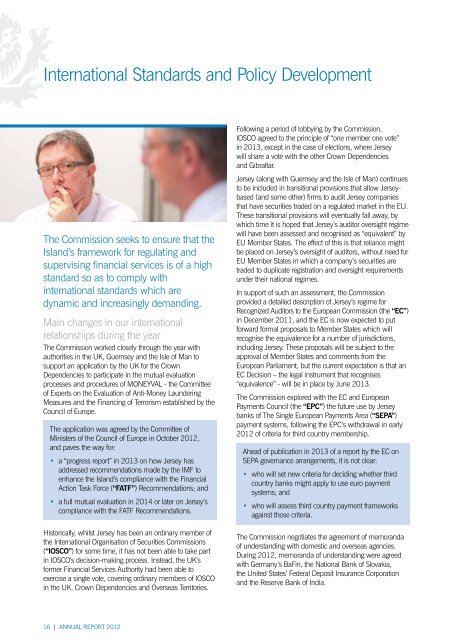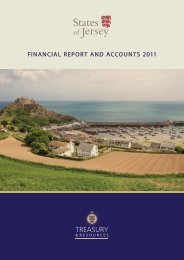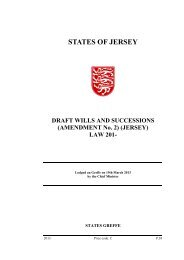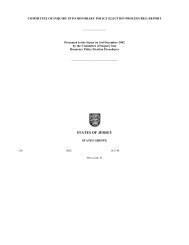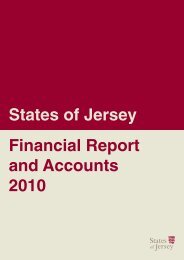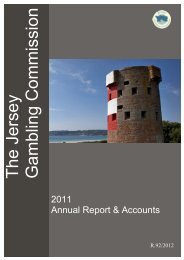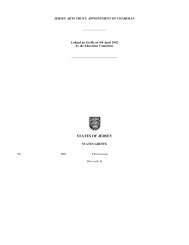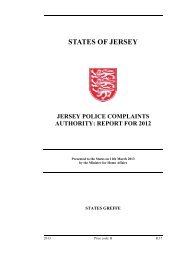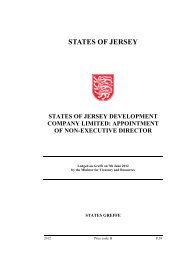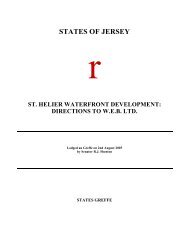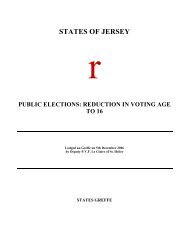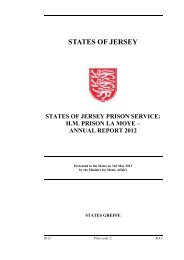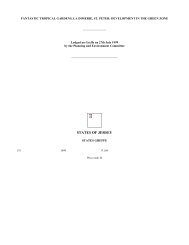Annual Report 2012 - the Jersey Financial Services Commission
Annual Report 2012 - the Jersey Financial Services Commission
Annual Report 2012 - the Jersey Financial Services Commission
You also want an ePaper? Increase the reach of your titles
YUMPU automatically turns print PDFs into web optimized ePapers that Google loves.
International Standards and Policy DevelopmentThe <strong>Commission</strong> seeks to ensure that <strong>the</strong>Island’s framework for regulating andsupervising financial services is of a highstandard so as to comply withinternational standards which aredynamic and increasingly demanding.Main changes in our internationalrelationships during <strong>the</strong> yearThe <strong>Commission</strong> worked closely through <strong>the</strong> year withauthorities in <strong>the</strong> UK, Guernsey and <strong>the</strong> Isle of Man tosupport an application by <strong>the</strong> UK for <strong>the</strong> CrownDependencies to participate in <strong>the</strong> mutual evaluationprocesses and procedures of MONEYVAL - <strong>the</strong> Committeeof Experts on <strong>the</strong> Evaluation of Anti-Money LaunderingMeasures and <strong>the</strong> Financing of Terrorism established by <strong>the</strong>Council of Europe.The application was agreed by <strong>the</strong> Committee ofMinisters of <strong>the</strong> Council of Europe in October <strong>2012</strong>,and paves <strong>the</strong> way for:• a “progress report” in 2013 on how <strong>Jersey</strong> hasaddressed recommendations made by <strong>the</strong> IMF toenhance <strong>the</strong> Island’s compliance with <strong>the</strong> <strong>Financial</strong>Action Task Force (“FATF”) Recommendations; and• a full mutual evaluation in 2014 or later on <strong>Jersey</strong>’scompliance with <strong>the</strong> FATF Recommendations.Historically, whilst <strong>Jersey</strong> has been an ordinary member of<strong>the</strong> International Organisation of Securities <strong>Commission</strong>s(“IOSCO”) for some time, it has not been able to take partin IOSCO’s decision-making process. Instead, <strong>the</strong> UK’sformer <strong>Financial</strong> <strong>Services</strong> Authority had been able toexercise a single vote, covering ordinary members of IOSCOin <strong>the</strong> UK, Crown Dependencies and Overseas Territories.Following a period of lobbying by <strong>the</strong> <strong>Commission</strong>,IOSCO agreed to <strong>the</strong> principle of “one member one vote”in 2013, except in <strong>the</strong> case of elections, where <strong>Jersey</strong>will share a vote with <strong>the</strong> o<strong>the</strong>r Crown Dependenciesand Gibraltar.<strong>Jersey</strong> (along with Guernsey and <strong>the</strong> Isle of Man) continuesto be included in transitional provisions that allow <strong>Jersey</strong>based(and some o<strong>the</strong>r) firms to audit <strong>Jersey</strong> companiesthat have securities traded on a regulated market in <strong>the</strong> EU.These transitional provisions will eventually fall away, bywhich time it is hoped that <strong>Jersey</strong>’s auditor oversight regimewill have been assessed and recognised as “equivalent” byEU Member States. The effect of this is that reliance mightbe placed on <strong>Jersey</strong>’s oversight of auditors, without need forEU Member States in which a company’s securities aretraded to duplicate registration and oversight requirementsunder <strong>the</strong>ir national regimes.In support of such an assessment, <strong>the</strong> <strong>Commission</strong>provided a detailed description of <strong>Jersey</strong>’s regime forRecognized Auditors to <strong>the</strong> European <strong>Commission</strong> (<strong>the</strong> “EC”)in December 2011, and <strong>the</strong> EC is now expected to putforward formal proposals to Member States which willrecognise <strong>the</strong> equivalence for a number of jurisdictions,including <strong>Jersey</strong>. These proposals will be subject to <strong>the</strong>approval of Member States and comments from <strong>the</strong>European Parliament, but <strong>the</strong> current expectation is that anEC Decision – <strong>the</strong> legal instrument that recognises“equivalence” - will be in place by June 2013.The <strong>Commission</strong> explored with <strong>the</strong> EC and EuropeanPayments Council (<strong>the</strong> “EPC”) <strong>the</strong> future use by <strong>Jersey</strong>banks of The Single European Payments Area (“SEPA”)payment systems, following <strong>the</strong> EPC’s withdrawal in early<strong>2012</strong> of criteria for third country membership.Ahead of publication in 2013 of a report by <strong>the</strong> EC onSEPA governance arrangements, it is not clear:• who will set new criteria for deciding whe<strong>the</strong>r thirdcountry banks might apply to use euro paymentsystems; and• who will assess third country payment frameworksagainst those criteria.The <strong>Commission</strong> negotiates <strong>the</strong> agreement of memorandaof understanding with domestic and overseas agencies.During <strong>2012</strong>, memoranda of understanding were agreedwith Germany’s BaFin, <strong>the</strong> National Bank of Slovakia,<strong>the</strong> United States’ Federal Deposit Insurance Corporationand <strong>the</strong> Reserve Bank of India.16 | ANNUAL REPORT <strong>2012</strong>


